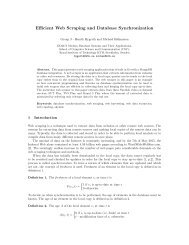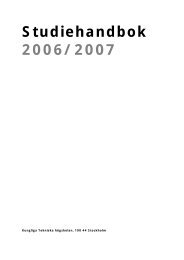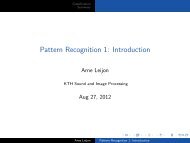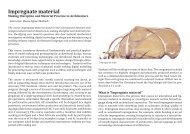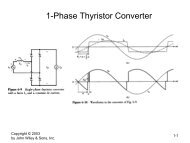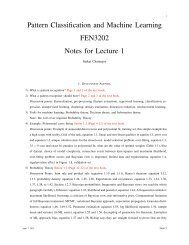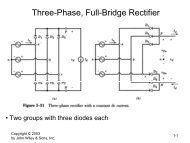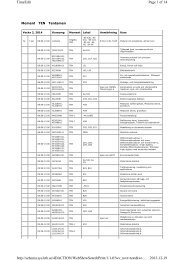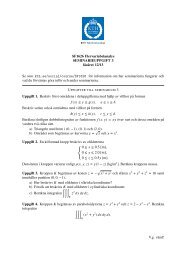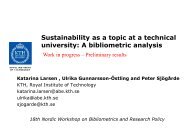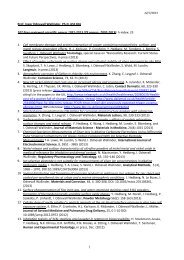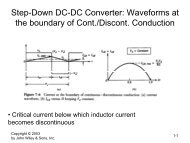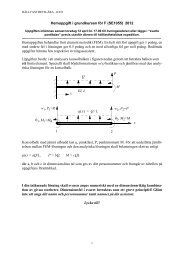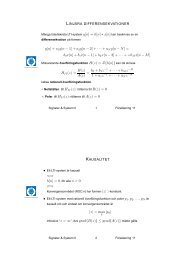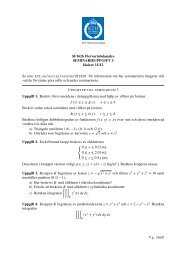doctoral program tied to the access linnaeus center - KTH
doctoral program tied to the access linnaeus center - KTH
doctoral program tied to the access linnaeus center - KTH
- No tags were found...
Create successful ePaper yourself
Turn your PDF publications into a flip-book with our unique Google optimized e-Paper software.
DOCTORAL PROGRAM TIED TO THE<br />
ACCESS LINNAEUS CENTER<br />
<strong>KTH</strong> Linnaeus Center for<br />
Au<strong>to</strong>nomic Complex Communication<br />
Networks, Signals and Systems<br />
www.<strong>access</strong>.ee.kth.se<br />
Evaluation Report<br />
prepared for <strong>the</strong><br />
Swedish Research Council<br />
Oc<strong>to</strong>ber 25, 2011
Contents<br />
Summary ................................................................................................................................................. 1<br />
Questions <strong>to</strong> <strong>the</strong> Vice Chancellor of <strong>KTH</strong> .............................................................................................. 1<br />
Questions <strong>to</strong> <strong>the</strong> Direc<strong>to</strong>r of <strong>the</strong> <strong>doc<strong>to</strong>ral</strong> <strong>program</strong> .................................................................................. 2<br />
Appendix 1: list of ACCESS PhD<br />
Appendix 2: Economic report July 2006 – June 2011<br />
Appendix 3: Financial plan July 2011 – June 2016
Summary<br />
The ACCESS graduate school has initiated Ph.D. courses in new relevant areas. There has<br />
been a balance between courses given by <strong>KTH</strong> faculty and guests professors. We have also<br />
successfully attracted students from outside <strong>the</strong> ACCESS research environment. The overall<br />
impression we get from <strong>the</strong> <strong>the</strong> Ph.D. students is that <strong>the</strong>y think <strong>the</strong> courses in <strong>the</strong> <strong>program</strong> are<br />
valuable and of high quality. We do not have any major plans for changing <strong>the</strong> <strong>program</strong>. The<br />
main challenge in <strong>the</strong> remaining period of funding is that by <strong>the</strong> end of it, <strong>the</strong> ACCESS<br />
graduate school needs <strong>to</strong> be <strong>to</strong> a large extent integrated in <strong>the</strong> formal <strong>KTH</strong> <strong>doc<strong>to</strong>ral</strong> <strong>program</strong>s<br />
with which it overlaps. This in order <strong>to</strong> secure a sustainable solution that will continue <strong>to</strong> exist<br />
after <strong>the</strong> VR funding ends.<br />
Questions <strong>to</strong> <strong>the</strong> Vice Chancellor of <strong>KTH</strong><br />
1. Has <strong>the</strong> <strong>doc<strong>to</strong>ral</strong> <strong>program</strong> influenced <strong>the</strong> strategic priorities of <strong>the</strong> university/HEI (higher<br />
education institution)? If so, please describe.<br />
All PhD level education at <strong>KTH</strong> is now organized as formal <strong>doc<strong>to</strong>ral</strong> <strong>program</strong>s<br />
(dok<strong>to</strong>rs<strong>program</strong>). The ACCESS graduate school, and <strong>the</strong> related (but now closed) national<br />
graduate school for telecommunications (GST), served as useful models in <strong>the</strong> development<br />
of principles for new <strong>doc<strong>to</strong>ral</strong> <strong>program</strong>s; Mikael Skoglund was a member of <strong>the</strong> committee,<br />
appointed by <strong>the</strong> <strong>KTH</strong> Faculty Dean, that prepared guidelines for <strong>the</strong> new <strong>program</strong>s.<br />
2. What share of <strong>the</strong> courses offered by <strong>the</strong> <strong>doc<strong>to</strong>ral</strong> <strong>program</strong> are new courses at <strong>the</strong><br />
university?<br />
All courses are new courses. (Ei<strong>the</strong>r completely “new” or significantly updated and<br />
redeveloped versions of previously existing courses.)<br />
3. Has <strong>the</strong> <strong>doc<strong>to</strong>ral</strong> <strong>program</strong> streng<strong>the</strong>ned <strong>the</strong> postgraduate education and, if so, how?<br />
Besides serving as a one useful model in preparing for new <strong>doc<strong>to</strong>ral</strong> <strong>program</strong>s all over <strong>KTH</strong>,<br />
<strong>the</strong> ACCESS graduate school has streng<strong>the</strong>ned <strong>the</strong> PhD education at <strong>KTH</strong> in, for example, <strong>the</strong><br />
following ways:<br />
− New courses are now offered on <strong>to</strong>pics that lie on <strong>the</strong> boundary between traditional<br />
disciplines (ämnen).<br />
− The ACCESS graduate school serves <strong>the</strong> important purpose of uniting <strong>the</strong> students in<br />
<strong>the</strong> general field of <strong>the</strong> ACCESS environment.<br />
− The ACCESS graduate school has successfully disseminated results and knowledge <strong>to</strong><br />
PhD students who are not directly associated with <strong>the</strong> ACCESS environment.<br />
− Through <strong>the</strong> series of intensive courses presented by guest professors, <strong>the</strong> ACCESS<br />
graduate school has successfully marketed ACCESS and <strong>KTH</strong> and created multiple<br />
new important connections between <strong>KTH</strong> and world-leading international institutions.<br />
1
Questions <strong>to</strong> <strong>the</strong> Direc<strong>to</strong>r of <strong>the</strong> <strong>doc<strong>to</strong>ral</strong> <strong>program</strong><br />
1. Describe how <strong>the</strong> <strong>doc<strong>to</strong>ral</strong> <strong>program</strong> has been managed and organized since <strong>the</strong> previous<br />
evaluation (conducted in 2008). Which parts have performed well, and which ones have not<br />
performed as well? Have <strong>the</strong> organization and <strong>the</strong> management been changed and, if so, how<br />
and why?<br />
As before, <strong>the</strong> <strong>program</strong> is lead by <strong>the</strong> coordina<strong>to</strong>r/direc<strong>to</strong>r, Mikael Skoglund. Skoglund is a<br />
chaired professor of communication <strong>the</strong>ory since 2003. His experience, relevant <strong>to</strong> his role<br />
here, includes being direc<strong>to</strong>r for <strong>KTH</strong>’s master <strong>program</strong> in wireless systems during 2002–05,<br />
head of <strong>the</strong> communication <strong>the</strong>ory labora<strong>to</strong>ry at <strong>KTH</strong> since 2004, and vice-dean for Electrical<br />
Engineering since 2009. He has also been on <strong>the</strong> EE undergraduate education committee and<br />
he was responsible for <strong>the</strong> communications specializations at <strong>the</strong> I and E <strong>program</strong>s at <strong>KTH</strong>.<br />
The direc<strong>to</strong>r is interacting with <strong>the</strong> <strong>program</strong> steering committee, presently comprising <strong>the</strong><br />
following members:<br />
− Bo Wahlberg, Chairman (professor)<br />
− Karl Henrik Johansson (professor)<br />
− Magnus Jansson (docent)<br />
− Stylianos Gisdakis (PhD student)<br />
− Haopeng Li (PhD student)<br />
Since 2008, Johansson has replaced Björn Ottersten (reason: Johansson is <strong>the</strong> new overall<br />
direc<strong>to</strong>r for <strong>the</strong> ACCESS Center), and Jansson has replaced Ulf Jönsson (who tragically<br />
passed away in early 2011). Wahlberg is <strong>the</strong> appointed chairman since <strong>the</strong> launch of <strong>the</strong><br />
graduate school. He has long experience in undergraduate and graduate education, including<br />
being a vice president of <strong>KTH</strong> “prorek<strong>to</strong>r” 1999–2002, responsible for academic affairs,<br />
including undergraduate and graduate education.<br />
2. Please comment on how <strong>the</strong> recommendations (if any) from <strong>the</strong> evaluation panel<br />
conducting <strong>the</strong> first evaluation (in 2008) have been taken in<strong>to</strong> consideration.<br />
There were no specific such recommendations.<br />
3. Have <strong>the</strong> goals, as formulated in <strong>the</strong> call for applications, been achieved?<br />
We think in general, “yes very much so.” Below, we comment in more detail how we think<br />
<strong>the</strong> goals have been met.<br />
How has <strong>the</strong> <strong>doc<strong>to</strong>ral</strong> <strong>program</strong>me streng<strong>the</strong>ned <strong>the</strong> Linnaeus environment?<br />
The ACCESS graduate school has initiated multiple new Ph.D. courses, which integrate<br />
research areas and <strong>the</strong> competences of <strong>the</strong> different groups in <strong>the</strong> <strong>center</strong>. The steering<br />
committee has invited <strong>the</strong> ACCESS research groups <strong>to</strong> propose new courses, in all relevant<br />
areas. However, we have in particular solicited proposals in areas where a lack has been<br />
identified. The goal has been <strong>to</strong> support courses on new <strong>to</strong>pics and lay a foundation for<br />
research in emerging relevant fields within <strong>the</strong> ACCESS environment. Initially, we also<br />
supported renewal of existing courses in order for <strong>the</strong>m <strong>to</strong> better fit <strong>the</strong> objectives of<br />
ACCESS. However during <strong>the</strong> past three years <strong>the</strong> focus has been on supporting entirely new<br />
courses. One particularly important strategy has been <strong>to</strong> invite visiting professors with <strong>the</strong><br />
2
ight competence <strong>to</strong> give new courses based on <strong>the</strong>ir own material. This has been an efficient<br />
way <strong>to</strong> obtain excellent courses in new areas.<br />
The ACCESS graduate school has also initiated joint courses with partners. We have for<br />
example sponsored intensive courses / workshops on Statistical Mechanics of Distributed<br />
Information Systems, Statistical Mechanics of Game Theory, Learning and Inference (jointly<br />
with NORDITA and The Academy of Finland). Ano<strong>the</strong>r effort, jointly with <strong>the</strong> ACCESS<br />
research <strong>center</strong>, is <strong>the</strong> ACCESS Distinguished Lecture Series, which has also had a very<br />
important educational role. For <strong>the</strong> lecture series, we have invited world leading researchers <strong>to</strong><br />
give broader surveys of <strong>the</strong>ir current research. This has been highly successful and<br />
appreciated by Ph.D. students and Faculty; each seminar usually attracts 50 <strong>to</strong> 60 participants.<br />
Most of <strong>the</strong>se are Ph.D. students. Our experience so far is very positive. The ACCESS<br />
graduate school has initiated Ph.D. courses in new relevant areas, and <strong>the</strong>re has been a<br />
balance between courses given by <strong>KTH</strong> faculty and guests professors. The new courses have<br />
bridged several crucial gaps on <strong>the</strong> boundaries between traditional disciplines. Two important<br />
<strong>to</strong>pics for such courses are, for example, Game Theory and Bayesian Networks. The new<br />
courses also serve <strong>the</strong> important purpose of creating a “we” feeling among <strong>the</strong> ACCESS<br />
graduate students and also market <strong>the</strong> <strong>center</strong> <strong>to</strong>ward research environments that are not<br />
formally part of <strong>the</strong> ACCESS Center.<br />
How has <strong>the</strong> <strong>doc<strong>to</strong>ral</strong> <strong>program</strong>’s association with <strong>the</strong> Linnaeus environment affected<br />
postgraduate students in o<strong>the</strong>r research groups?<br />
We have successfully attracted students from outside <strong>the</strong> ACCESS research environment, see<br />
Appendix 1 for a list of students.<br />
4. Describe <strong>the</strong> courses currently offered in <strong>the</strong> <strong>doc<strong>to</strong>ral</strong> <strong>program</strong>me and <strong>the</strong> reasons for<br />
arranging <strong>the</strong>se particular courses. Are <strong>the</strong>re courses that would have been desirable <strong>to</strong><br />
organize within <strong>the</strong> <strong>doc<strong>to</strong>ral</strong> <strong>program</strong>me, but could not be arranged for various reasons? If<br />
so, please describe <strong>the</strong> reasons.<br />
The ACCESS graduate school direc<strong>to</strong>r is responsible for <strong>the</strong> curriculum. Courses are<br />
developed by <strong>the</strong> responsible teachers. With <strong>the</strong> quality assessments and <strong>the</strong> interests of <strong>the</strong><br />
ACCESS environment as a basis, <strong>the</strong> long term evolution of <strong>the</strong> curriculum is moni<strong>to</strong>red by<br />
<strong>the</strong> direc<strong>to</strong>r and <strong>the</strong> study committee. Decisions regarding adoption of new courses <strong>to</strong> <strong>the</strong><br />
curriculum are prepared by <strong>the</strong> direc<strong>to</strong>r, and taken by <strong>the</strong> study committee. Teachers in <strong>the</strong><br />
ACCESS environment can propose new courses. Alternatively, <strong>the</strong> direc<strong>to</strong>r and/or study<br />
committee can identify <strong>the</strong> need for a course on a certain <strong>to</strong>pic, and contact relevant research<br />
groups and solicit proposals. When a course is adopted <strong>to</strong> <strong>the</strong> curriculum, <strong>the</strong> responsible<br />
teacher (his/her group or department) is eligible for financial support from <strong>the</strong> ACCESS<br />
graduate school.<br />
The ACCESS graduate school courses are classified in<strong>to</strong> different categories, as follows: A<br />
prepara<strong>to</strong>ry course gives an advanced introduction <strong>to</strong> a relevant <strong>to</strong>pic, with <strong>the</strong> purpose <strong>to</strong><br />
provide necessary knowledge <strong>to</strong> pursue research in <strong>the</strong> areas defined by <strong>the</strong> ACCESS<br />
environment. Prepara<strong>to</strong>ry courses are presented on a regular basis; nominally at an interval of<br />
at most two years.<br />
3
A specialized course is directed <strong>to</strong>ward Ph.D. students that are well underway in <strong>the</strong>ir<br />
studies, and will cover advanced <strong>to</strong>pics, better tailored <strong>to</strong> <strong>the</strong> specialized fields of research in<br />
<strong>the</strong> general area of <strong>the</strong> ACCESS environment. These courses are not necessarily presented on<br />
a regular basis.<br />
An intensive course is presented at a high pace over a relatively short period of time (1 day <strong>to</strong><br />
3 weeks), typically by a visiting scientist or guest professor. As mentioned, <strong>the</strong> main goal of<br />
<strong>the</strong> ACCESS graduate school is <strong>to</strong> offer courses that bridge gaps between traditional research<br />
areas. Ano<strong>the</strong>r very important goal is <strong>to</strong> use ACCESS graduate school funding <strong>to</strong> be able <strong>to</strong><br />
attract international <strong>to</strong>p-researchers <strong>to</strong> come <strong>to</strong> <strong>KTH</strong> <strong>to</strong> present intensive courses.<br />
During 2007–8 <strong>the</strong> ACCESS graduate school also offered a summer school. This was done<br />
jointly with <strong>the</strong> National Graduate School for Telecommunications (GST). The GST was <strong>the</strong><br />
main source of funding for this event. Since <strong>the</strong> GST is now closed we have however not been<br />
able <strong>to</strong> fit an ambitious summer school in<strong>to</strong> <strong>the</strong> curriculum for <strong>the</strong> ACCESS graduate school,<br />
and we have instead given priority <strong>to</strong> new courses and invited guest lecturers.<br />
5. Has <strong>the</strong>re been any attempt <strong>to</strong> determine what <strong>the</strong> postgraduate students think about <strong>the</strong><br />
education provided by <strong>the</strong> <strong>doc<strong>to</strong>ral</strong> <strong>program</strong>me (for example by a questionnaire)? If so, what<br />
were <strong>the</strong> results?<br />
As part of <strong>the</strong> requirement <strong>to</strong> receive ACCESS graduate school funding, <strong>the</strong> responsible<br />
teacher in each course is expected <strong>to</strong> submit a self-evaluation of <strong>the</strong> course after completion.<br />
A formal course evaluation (based on questionnaires <strong>to</strong> students) is not manda<strong>to</strong>ry, partly<br />
since it is hard <strong>to</strong> implement such evaluations in courses with few participants. However,<br />
many teachers still choose <strong>to</strong> perform evaluations. Since we do not have evaluations for all<br />
courses, and since we have not formally summarized <strong>the</strong> evaluations received, we choose not<br />
<strong>to</strong> comment on <strong>the</strong> result of evaluations of particular courses. However, based on <strong>the</strong> input we<br />
have, we feel that it is safe <strong>to</strong> say <strong>the</strong> following: 1) ACCESS graduate school courses are in<br />
general highly appreciated and well-received by <strong>the</strong> students; 2) <strong>the</strong> intensive courses<br />
presented by externally invited guest professors are <strong>the</strong> single most important added-value<br />
created by <strong>the</strong> graduate school.<br />
6. Describe <strong>the</strong> ways in which <strong>the</strong> <strong>doc<strong>to</strong>ral</strong> <strong>program</strong>me has influenced <strong>the</strong> education of postgraduate<br />
students.<br />
The focus of <strong>the</strong> ACCESS graduate school is <strong>to</strong> initiate new Ph.D. courses, which integrate<br />
research areas and <strong>the</strong> competences of <strong>the</strong> different groups in <strong>the</strong> <strong>center</strong>. Our strategy is <strong>to</strong> use<br />
ACCESS graduate school funding <strong>to</strong> complement existing Ph.D. education initiatives at <strong>KTH</strong>,<br />
with a focus on complementing o<strong>the</strong>r existing courses <strong>to</strong> cover <strong>the</strong> boundary between<br />
ACCESS Center research <strong>to</strong>pics.<br />
The study committee has invited <strong>the</strong> ACCESS research groups <strong>to</strong> propose new courses, in all<br />
relevant areas. However, we have in particular solicited proposals in areas where a lack has<br />
been identified. The goal has been <strong>to</strong> support courses on new <strong>to</strong>pics and lay a foundation for<br />
research in emerging relevant fields within <strong>the</strong> ACCESS environment. During <strong>the</strong> first two<br />
years of <strong>the</strong> ACCESS graduate school, we also supported renewal of existing courses in order<br />
for <strong>the</strong>m <strong>to</strong> better fit <strong>the</strong> objectives of ACCESS, however our focus is now on only supporting<br />
completely new courses. These efforts have been complemented by our strategy <strong>to</strong> invite<br />
4
visiting professors with <strong>the</strong> right competence <strong>to</strong> give new courses based on <strong>the</strong>ir own material.<br />
This has been an efficient way <strong>to</strong> obtain excellent courses in new areas. Our experience with<br />
courses presented by external visi<strong>to</strong>rs is very positive and we will continue with this strategy.<br />
Our extensive international collaborations and our reputation make it attractive for world class<br />
researchers <strong>to</strong> visit. In addition, <strong>the</strong> ACCESS research <strong>center</strong> coordinates a mobility <strong>program</strong><br />
<strong>to</strong> support this.<br />
As mentioned, <strong>the</strong> ACCESS graduate school has also been influential in preparing strategies<br />
and formats for <strong>the</strong> new <strong>doc<strong>to</strong>ral</strong> <strong>program</strong>s at <strong>KTH</strong>. The ACCESS graduate school direc<strong>to</strong>r,<br />
Mikael Skoglund, was a member of <strong>the</strong> committee that prepared instructions for <strong>the</strong> new<br />
<strong>program</strong>s. The three new <strong>program</strong>s that are most overlapping with ACCESS are those in<br />
Electrical Engineering (Elektro- och systemteknik), Computer Science (Datalogi) and Applied<br />
and Computational Ma<strong>the</strong>matics (Tillämpad matematik).<br />
In addition, <strong>the</strong> ACCESS graduate school has initiated joint courses with partners, for<br />
example <strong>the</strong> Summer School is held jointly with <strong>the</strong> GST. We have also sponsored an<br />
intensive course / workshop on Statistical Mechanics of Distributed Information Systems<br />
(jointly with NORDITA and The Academy of Finland). Ano<strong>the</strong>r effort, jointly with <strong>the</strong><br />
ACCESS research <strong>center</strong>, is <strong>the</strong> ACCESS Distinguished Lecture Series, which has also had a<br />
very important educational role. For <strong>the</strong> lecture series, we have invited world leading<br />
researchers <strong>to</strong> give broader surveys of <strong>the</strong>ir current research. This has been highly successful<br />
and appreciated by Ph.D. students and Faculty; each seminar usually attracts 50 <strong>to</strong> 60<br />
participants. Most of <strong>the</strong>se are Ph.D. students.<br />
7. What are <strong>the</strong> plans for <strong>the</strong> <strong>doc<strong>to</strong>ral</strong> <strong>program</strong>me for <strong>the</strong> remaining period? What changes<br />
have been made compared <strong>to</strong> <strong>the</strong> original plan?<br />
Since we think <strong>the</strong> present way of running <strong>the</strong> ACCESS graduate school is successful, we do<br />
not have any plans for major changes, and we still follow <strong>the</strong> original plan. The one main<br />
change so far is that we do no longer offer an ambitious summer school (see discussion<br />
above), <strong>to</strong> make room for new courses and invited guest professors. Fur<strong>the</strong>rmore, <strong>the</strong> one<br />
major challenge for <strong>the</strong> coming period is that we need <strong>to</strong> start integrate <strong>the</strong> activities in <strong>the</strong><br />
ACCESS graduate school in<strong>to</strong> <strong>the</strong> relevant <strong>KTH</strong> <strong>doc<strong>to</strong>ral</strong> <strong>program</strong>s, in order <strong>to</strong> prepare for a<br />
smooth transition when <strong>the</strong> funding for <strong>the</strong> ACCESS graduate school end.<br />
8. What is your prognosis regarding <strong>the</strong> standing of <strong>the</strong> <strong>doc<strong>to</strong>ral</strong> <strong>program</strong>me ten years from<br />
now? What is your strategy for maintaining a strong <strong>doc<strong>to</strong>ral</strong> <strong>program</strong>me after <strong>the</strong> grant<br />
period?<br />
As mentioned, our plan is <strong>to</strong> slowly start <strong>to</strong> integrate <strong>the</strong> courses in <strong>the</strong> ACCESS graduate<br />
school in<strong>to</strong> <strong>the</strong> relevant <strong>KTH</strong> <strong>doc<strong>to</strong>ral</strong> <strong>program</strong>s, that is, those in Electrical Engineering<br />
(Elektro- och systemteknik), Computer Science (Datalogi) and Applied and Computational<br />
Ma<strong>the</strong>matics (Tillämpad matematik). Our prognosis on <strong>the</strong> standing of <strong>the</strong> ACCESS graduate<br />
school in ten years is that it is by <strong>the</strong>n fully integrated in <strong>the</strong>se <strong>KTH</strong> <strong>doc<strong>to</strong>ral</strong> <strong>program</strong>s.<br />
9. With which research groups does <strong>the</strong> <strong>doc<strong>to</strong>ral</strong> <strong>program</strong>me collaborate? Describe this<br />
collaboration and its added value.<br />
5
The ACCESS graduate school does not formally collaborate with groups or environments<br />
outside <strong>the</strong> ACCESS Linnaeus <strong>center</strong> when it comes <strong>to</strong> preparing and moni<strong>to</strong>ring a<br />
curriculum, etc. However <strong>the</strong> graduate school benefits greatly from <strong>the</strong> many research<br />
collaborations that are entertained by ACCESS Faculty members. Fur<strong>the</strong>rmore, we wish <strong>to</strong>,<br />
once more, stress <strong>the</strong> importance of our series of intensive courses presented by guest<br />
researchers/professors.<br />
10. How are postgraduate students admitted <strong>to</strong> courses in <strong>the</strong> <strong>doc<strong>to</strong>ral</strong> <strong>program</strong>me? How<br />
many applicants are <strong>the</strong>re for each place? Describe <strong>the</strong> profile of <strong>the</strong> applicant group<br />
(including gender distribution) and <strong>the</strong> selection process.<br />
The ACCESS graduate school courses are open <strong>to</strong> ACCESS <strong>doc<strong>to</strong>ral</strong> students, o<strong>the</strong>r <strong>doc<strong>to</strong>ral</strong><br />
students, industry researchers and senior master/engineering students (primarily <strong>the</strong><br />
prepara<strong>to</strong>ry courses). Courses are advertised in several different ways:<br />
− They are listed on <strong>the</strong> ACCESS graduate school web-page;<br />
− The ACCESS graduate school direc<strong>to</strong>r sends announcements and reminders <strong>to</strong> all<br />
ACCESS research groups via email;<br />
− The courses are advertised via <strong>the</strong> same email lists as where ACCESS seminars and<br />
<strong>the</strong> ACCESS distinguished lecture series are announced;<br />
− Each individual teacher advertises his/her own course, through own channels.<br />
For each course, <strong>the</strong> responsible teacher takes <strong>the</strong> final decision in admitting a student <strong>to</strong> <strong>the</strong><br />
course. In general, <strong>the</strong> ACCESS graduate school strives <strong>to</strong> attract only highly motivated<br />
students. We advise <strong>the</strong> teachers <strong>to</strong> clearly state <strong>the</strong> required prerequisites for each course, and<br />
<strong>to</strong> check that accepted students fulfill <strong>the</strong>se.<br />
6
Appendix 1<br />
Present a list of courses, course leaders, lecturers and participants in courses that <strong>the</strong><br />
<strong>doc<strong>to</strong>ral</strong> <strong>program</strong>me has offered since you submitted <strong>the</strong> report ffor <strong>the</strong> previous evaluation<br />
(in 2008).<br />
Courses<br />
The following is a list of courses presented during 2008–2011 (including courses scheduled <strong>to</strong><br />
be given later during <strong>the</strong> Fall 2011). Additional information can be found here:<br />
www.<strong>access</strong>.kth.se - link <strong>to</strong> ‘Graduate School.’<br />
Fall 2011<br />
– Sparse signal processing, specialized course<br />
– Principles of wireless sensor networks, specialized course<br />
– Parallel and distributed computing, specialized course<br />
– Research communication, prepara<strong>to</strong>ry<br />
Spring 2011<br />
– Multi-agent and networked control systems, specialized course<br />
– Bayesian networks, prepara<strong>to</strong>ry<br />
– Game <strong>the</strong>ory, prepara<strong>to</strong>ry course<br />
Fall 2010<br />
– Sensornet <strong>program</strong>ming, specialized<br />
– Internet congestion control, intensive, Prof. Steven Low<br />
– Network algorithms, specialized<br />
Spring 2010<br />
– Advanced Topics in Hybrid and Embedded Control Systems, Prof. Claire Tomlin<br />
– Generalized principal component analysis, intensive, Prof. Shankar Sastry<br />
– Distributed optimization, intensive, Prof. Stephen Boyd<br />
– Convex optimization methods for robust control, intensive, Prof. Roy Smith<br />
– Statistical mechanics of learning and inference, intensive/workshop<br />
– Multiuser information <strong>the</strong>ory, specialized course<br />
– Nonlinear Systems: Analysis and Control, prepara<strong>to</strong>ry course<br />
Fall 2009<br />
– Temporal logic, intensive course<br />
– Principles of wireless sensor networks, specialized course<br />
– A celebration of <strong>the</strong> field of systems and control, intensive/workshop<br />
– System identification, prepara<strong>to</strong>ry course<br />
– Games, decisions and information, specialized course<br />
Spring 2009<br />
– Complex systems<br />
– Statistical mechanics of game <strong>the</strong>ory<br />
– Game <strong>the</strong>ory, prepara<strong>to</strong>ry course<br />
– Bayesian networks, prepara<strong>to</strong>ry course
Fall 2008<br />
– The generalized moment problem and rational measures, intensive course, Prof.<br />
Chris<strong>to</strong>pher Byrnes<br />
– Introduction <strong>to</strong> Model Order Reduction, specialized course<br />
– WSN <strong>program</strong>ming, intensive course<br />
Summer and Fall 2008<br />
– Global navigation satellite systems, specialized course<br />
Spring 2008<br />
– PhysDIS: physics of distributed information systems, intensive course/workshop<br />
– Nonlinear Systems: Analysis and Control, prepara<strong>to</strong>ry course<br />
– S<strong>to</strong>chastic Estimation and Control, intensive course<br />
Non-ACCESS students<br />
The following is a list of PhD students that have followed courses sponsored by <strong>the</strong> ACCESS<br />
Graduate school, and who are not directly active in <strong>the</strong> ACCESS environment:<br />
– Per Austrin, <strong>KTH</strong>/CSC<br />
– Fredrik Carlsson, <strong>KTH</strong>/SCI<br />
– Mikael Fallgren, <strong>KTH</strong>/SCI<br />
– Mats Werne, <strong>KTH</strong>/SCI<br />
– Per Sahlholm, <strong>KTH</strong>/EE<br />
– Tahir Naseer Queshi, <strong>KTH</strong>/ITM<br />
– Erik Nordström, Uppsala<br />
– Kris<strong>to</strong>ffer Sjöö, <strong>KTH</strong>/CAS<br />
– Andreas Lundblad, <strong>KTH</strong>/CSC<br />
– Juan Carlos Sanchez-Aarnoutse<br />
– Linus Gustafsson<br />
– Magnus Persson<br />
– Peter Almström<br />
– Pilar Manzanares<br />
– Seunghee Lee<br />
– Tahir Naseer Queshi, <strong>KTH</strong>/Machine Design<br />
– Kris<strong>to</strong>ffer Sjö, Nada/CAS<br />
– Danny Bickson, The Hebrew University of Jerusalem<br />
– Baki Cakici, SICS<br />
– Sang Hoon Lee, KAIST<br />
– Mikael Onsjö, Chalmers<br />
– Sadegh Raeisi, Sharif<br />
– Jack Raymond, As<strong>to</strong>n Univ<br />
– Jeremy Stribling, MIT<br />
– Shervin Bagheri, <strong>KTH</strong>/Mechanics<br />
– Steffen Waldherr, Uni. Stuttgart)<br />
– Christian Smith, <strong>KTH</strong>/CSC<br />
– Oscar Danielsson, <strong>KTH</strong>/CSC<br />
– Cristian Vasile Achin, Aal<strong>to</strong><br />
– Kartik Anand, The Abdus Salam International Centre for Theoretical Physics, Trieste<br />
– John Ardelius, SICS
– Chaitanya Gokhale, Max Planck Institute<br />
– Weini Huang, Max Plank Institute<br />
– Timo Ikonen, Aal<strong>to</strong><br />
– Juha Koivis<strong>to</strong>, Aal<strong>to</strong><br />
– Panos Papadopoulos, King’s College<br />
– Matti Pel<strong>to</strong>mäki, Aal<strong>to</strong><br />
– René Pfotzner, University of Jena<br />
– Francisco San<strong>to</strong>s, Université Libre de Bruxelles<br />
– Daniel Strömbom, Uppsala<br />
– Sven Van Segbroeck, Vrije Universiteit Brussel<br />
– Teodor Sommestad, <strong>KTH</strong>/ICS<br />
– Ulrik Franke, <strong>KTH</strong>/EES/ICS<br />
– Joel Höglund, SICS<br />
– Du Ho Kang, <strong>KTH</strong>/COS<br />
– Saltanat Khamit, <strong>KTH</strong>/COS<br />
– Ali Nazmi Özyagci, <strong>KTH</strong>/COS<br />
– Lei Shi, <strong>KTH</strong>/COS<br />
– Sibel Tombaz, <strong>KTH</strong>/COS<br />
– Cenny Wenner, S<strong>to</strong>ckholm University and <strong>KTH</strong>/CSC<br />
– Ibrahim Orhan, School of Health and Technology<br />
– Ubaldo Tiberi, UAQ<br />
– Jonas Wåhslén, School of Health and Technology<br />
– Dogan Yazar, Uppsala University and SICS<br />
– Prem Raj Adhikari, Aal<strong>to</strong><br />
– Venkat Chandrasekaran, MIT<br />
– Muhammad Ali Faisal, Aal<strong>to</strong><br />
– Jussi Gillberg, Aal<strong>to</strong><br />
– Hongli Zeng, Aal<strong>to</strong><br />
– Juan Carlos Vasquez, INRIA<br />
– Abdullah Al-Mamun, Univ. Southamp<strong>to</strong>n<br />
– Iacopo Mastromatteo, SISSA, Italy<br />
– Jason Sakellariou, Universite Paris Sud<br />
– Tommi Suvutaival, Aal<strong>to</strong><br />
– Dario Villamaina, La Sapienza, Rome<br />
– Seppo Virtanen, Aal<strong>to</strong><br />
– Aree Wi<strong>to</strong>elar, Univ. Groningen<br />
– Can Kilicbay, Uppsala<br />
– Biruk Silase Geletu, Blekinge Institute of Technology<br />
– Guillermo Rodríguez Cano, Uppsala<br />
– Ali Houmani, <strong>KTH</strong>/ICT<br />
– Magnus Jobs, Uppsala<br />
– Frederik Hermans, Uppsala<br />
– Fredrik Bjurefors, Uppsala<br />
– Olof Rensfelt, Uppsala<br />
– Fredrik Asplund, <strong>KTH</strong> Machine Design<br />
– Shervin Bagheri, <strong>KTH</strong>/SCI<br />
– Björn Halvarsson, Uppsala University<br />
– Erik Henriksson, <strong>KTH</strong>/EE<br />
– Rujiroj Leelaruji, <strong>KTH</strong>/EE<br />
– Charles Nader, ITB
– Erik Olofsson, <strong>KTH</strong>/EE<br />
– Maria Werlefors, Uppsala University<br />
In addition, multiple Erasmus exchange students (Master Level)
ACCESS PhD Students<br />
Name Last name<br />
Year<br />
of<br />
birth<br />
Year<br />
PhD<br />
planne<br />
d<br />
Male<br />
(M)/<br />
Femal<br />
e (F)<br />
Starting<br />
year in <strong>the</strong><br />
Linnaeus<br />
environme<br />
nt<br />
Ending year<br />
in <strong>the</strong><br />
Linnaeus<br />
environment<br />
% (of full<br />
time)<br />
participati<br />
on in <strong>the</strong><br />
Linnaeus<br />
environme<br />
nt<br />
1<br />
% (of<br />
full time)<br />
funded<br />
by <strong>the</strong><br />
Linnaeu<br />
s Grant<br />
or<br />
universit<br />
y cofinancin<br />
g<br />
% (of<br />
full<br />
time)<br />
extern<br />
al<br />
fundin<br />
g<br />
Main subject area in<br />
postgraduate education<br />
Main supervisor<br />
Research group in <strong>the</strong><br />
Linnaeus environment<br />
Leefke Dössel 1984 2014 F 2009 80 0 40 Telecommunications Lars Rasmussen Architecture & Concepts<br />
Iqbal Hussain 1979 2014 M 2009 80 0 40 Telecommunications Lars Rasmussen Architecture & Concepts<br />
Ian Marsh 1965 2009 M 2006 2009 50 0 0 Telecommunications Gunnar Karlsson Architecture & Concepts<br />
Ignacio Más 1971 2008 M 2006 2008 50 0 0 Telecommunications Gunnar Karlsson Architecture & Concepts<br />
Zaki Ahmed 1985 2015 M 2010 80 0 40 Telecommunications Lars Rasmussen Architecture &Concepts<br />
Ilias Chatzidrossos 1981 2011 M 2006 2011 80 0 0 Telecommunications Gunnar Karlsson Architecture &Concepts<br />
Jing Fu 1978 2008 M 2006 2008 80 0 0 Telecommunications Gunnar Karlsson Architecture &Concepts<br />
Maksym Girnyk 1984 2014 M 2009 80 0 40 Telecommunications Lars Rasmussen Architecture &Concepts<br />
Ioannis Glaropoulos 1981 2013 M 2008 2013 80 0 0 Telecommunications Gunnar Karlsson Architecture &Concepts<br />
An<strong>to</strong>nio Gonga 1983 2014 M 2009 80 0 80 Au<strong>to</strong>matic control Mikael Johansson Architecture &Concepts<br />
Anders Gunnar M 2005 2011 20 0 100 Au<strong>to</strong>matic control Mikael Johansson Architecture &Concepts<br />
Olafur Helgason 1976 2011 M 2006 2011 80 0 0 Telecommunications Gunnar Karlsson Architecture &Concepts<br />
Sylvia Kouyoumdjieva 1983 2014 F 2009 2014 80 0 0 Electrical Engineering Gunnar Karlsson Architecture &Concepts<br />
Peter Larsson 1966 2015 M 2010 80 0 40 Telecommunications Lars Rasmussen Architecture &Concepts<br />
Nan Li 2016 F 2011 80 0 40 Electrical Engineering Lars Rasmussen Architecture &Concepts<br />
Niels Möller 2008 M 2006 2008 80 0 80 Au<strong>to</strong>matic control Karl H. Johansson Architecture &Concepts<br />
Valentino Pacifici 1985 2015 M 2011 2015 80 0 0 Electrical Engineering Gunnar Karlsson Architecture &Concepts<br />
Ljubica Pajevic 1984 2014 F 2010 2014 80 0 0 Electrical Engineering Gunnar Karlsson Architecture &Concepts<br />
Pablo Soldati 1978 M 2005 2011 80 0 80 Au<strong>to</strong>matic control Mikael Johansson Architecture &Concepts<br />
Liping Wang 1982 2013 F 2008 2013 80 0 0 Telecommunications Gunnar Karlsson Architecture &Concepts<br />
Vladimir Vukadinovic 1977 2010 M 2006 2010 80 0 0 Telecommunications Gunnar Karlsson Architecture &Concepts<br />
Ognjen Vukovic 1985 2014 M 2010 2014 80 0 0 Telecommunications Gunnar Karlsson Architecture &Concepts
Zhenhua Zou 1984 2013 M 2009 80 0 80 Au<strong>to</strong>matic control Mikael Johansson Architecture &Concepts<br />
John Ardelius 1978 2012 M 2009 80 0 80 Distributed systems S. Krishnamurthy Computation & Algorithms<br />
Enrico Avventi 1980 2011 M 2006 50 20 80 Systems & control Anders Lindquist Computation & Algorithms<br />
Musard Balliu 1985 2014 M 2009 2014 80 0 80 Security Mads Dam Computation & Algorithms<br />
Greschbach Benjamin 1983 2016 M 2011 80 0 80 Security Sonja Buchegger Computation & Algorithms<br />
Oleksandr Bodriagov 1985 2015 M 2010 80 0 80 Security Sonja Buchegger Computation & Algorithms<br />
Mika Cohen 1978 2008 M 2006 2008 Security Mads Dam Computation & Algorithms<br />
Aymeric d'Herouel 1980 2011 M 2006 2011 80 40 40 Biological Physics Erik Aurell Computation & Algorithms<br />
Alber<strong>to</strong> Gonzalez 1977 2008 M 2006 2008 80 0 0 Telecommunications Rolf Stadler Computation & Algorithms<br />
Meng Guo 1988 2015 M 2011 80 0 80 Au<strong>to</strong>matic control Karl H. Johansson Computation & Algorithms<br />
Nicolas Innocenti 1986 2015 M 2010 2015 80 80 80 Biological Physics Erik Aurell Computation & Algorithms<br />
Kristján Jónsson 1975 2013 M 2009 2013 80 0 Distributed systems Mads Dam Computation & Algorithms<br />
Andreas Lundblad 1982 2012 M 2007 2012 80 0 80 Security Mads Dam Computation & Algorithms<br />
Hamid Mahdavian 2014 M 2010 80 0 80 Au<strong>to</strong>matic control Mikael Johansson Computation & Algorithms<br />
Karl Palmskog 1982 2014 M 2009 2014 80 0 80 Programming languages Mads Dam Computation & Algorithms<br />
Oliver Schwarz 1986 2014 M 2010 2015 80 0 80 Security Mads Dam Computation & Algorithms<br />
Bjorn Terelius 1984 2013 M 2008 2013 80 0 80 Cryp<strong>to</strong>graphy Douglas Wikström Computation & Algorithms<br />
Håkan Terelius 1987 2014 M 2010 80 0 80 Au<strong>to</strong>matic control Karl H. Johansson Computation & Algorithms<br />
Misbah Uddin 1983 2015 M 2011 2015 80 0 0 Telecommunications Rolf Stadler Computation & Algorithms<br />
Maria Werner 1978 2010 F 2006 2010 80 0 80 Biological Physics Erik Aurell Computation & Algorithms<br />
Fetahi Wuhib 1977 2010 M 2006 2010 80 0 0 Telecommunications Rolf Stadler Computation & Algorithms<br />
Rerngvit Yanggra<strong>to</strong>ke 1983 2015 M 2011 2015 80 0 0 Electrical Engineering Rolf Stadler Computation & Algorithms<br />
Hongli Zeng 1983 2012 F 2009 2012 40 0 0 Physics Erik Aurell Computation & Algorithms<br />
Hildur Æsa Oddsdóttir 1984 2015 F 2011 30 20 60 Optimization Forsgren Sensing & Actuation<br />
Assad Alami 2013 M 2009 80 0 100 Au<strong>to</strong>matic control Karl H. Johansson Sensing & Actuation<br />
Obada Alhaj Moussa 1982 2013 M 2008 80 0 80 Sound and Image Processing Bastiaan Kleijn Sensing & Actuation<br />
Martin Andreasson 1987 2015 M 2011 80 0 80 Au<strong>to</strong>matic control Karl H. Johansson Sensing & Actuation<br />
José Araujo 1985 2013 M 2008 80 0 80 Au<strong>to</strong>matic control Karl H. Johansson Sensing & Actuation<br />
Burak Demirel 1984 M 2009 80 0 80 Au<strong>to</strong>matic control Mikael Johansson Sensing & Actuation<br />
Piergiuseppe Di Marco 1983 2013 M 2008 80 0 100 Au<strong>to</strong>matic control Karl H. Johansson Sensing & Actuation<br />
Mikael Fallgren 1982 2011 M 2007 30 80 Optimization Forsgren Sensing & Actuation<br />
2
Farhad Farokhi 1987 2014 M 2010 80 0 80 Au<strong>to</strong>matic control Karl H. Johansson Sensing & Actuation<br />
Oscar Flärdh 1980 M 2009 80 0 80 Au<strong>to</strong>matic control Håkan Hjalmarsson Sensing & Actuation<br />
Erik Henriksson 1982 2012 M 2007 80 0 80 Au<strong>to</strong>matic control Karl H. Johansson Sensing & Actuation<br />
Gustav Henter 1980 2012 M 2007 80 0 80 Sound and Image Processing Bastiaan Kleijn Sensing & Actuation<br />
Janusz Klejsa 1981 2012 M 2006 80 0 80 Sound and Image Processing Bastiaan Kleijn Sensing & Actuation<br />
Ermin Kozica 1982 2011 M 2007 2011 80 0 80 Sound and Image Processing Bastiaan Kleijn Sensing & Actuation<br />
Haopeng Li 1985 2015 M 2010 80 0 80 Sound and Image Processing Arne Leijon Sensing & Actuation<br />
Magnus Lindhé 1978 2012 M 2006 80 0 80 Au<strong>to</strong>matic control Karl H. Johansson Sensing & Actuation<br />
Johan Markdahl 1982 2014 M 2010 30 80 Systems & control Xiaoming Hu Sensing & Actuation<br />
Anders Möller 1982 2012 M 2007 50 20 60 Systems & control Xiaoming Hu Sensing & Actuation<br />
Pangun Park 1980 2011 M 2007 2011 80 0 80 Au<strong>to</strong>matic control Karl H. Johansson Sensing & Actuation<br />
Petko Petkov 1980 2012 M 2007 80 0 80 Sound and Image Processing Bastiaan Kleijn Sensing & Actuation<br />
Pravin Rama Kumar 1982 2013 M 2008 80 0 80 Sound and Image Processing Bastiaan Kleijn Sensing & Actuation<br />
Chithrupa Ramesh 1982 2013 F 2008 80 0 80 Au<strong>to</strong>matic control Karl H. Johansson Sensing & Actuation<br />
Per Sahlholm 2011 M 2006 2011 80 0 80 Au<strong>to</strong>matic control Karl H. Johansson Sensing & Actuation<br />
Chris<strong>to</strong>pher Sturk 1982 2015 M 2010 80 0 80 Au<strong>to</strong>matic control Henrik Sandberg Sensing & Actuation<br />
Andre Teixeira 1986 2013 M 2009 80 0 80 Au<strong>to</strong>matic control Henrik Sandberg Sensing & Actuation<br />
Johan Thunberg 1982 2013 M 2009 50 30 50 Systems & control Xiaoming Hu Sensing & Actuation<br />
Yuecheng Yang 1986 2015 M 2011 30 80 Systems & control Xiaoming Hu Sensing & Actuation<br />
Guoqiang Zhang 1980 2010 M 2006 2010 80 0 80 Sound and Image Processing Bastiaan Kleijn Sensing & Actuation<br />
Mattias Andersson 1980 2012 M 2007 80 0 40 Telecommunications Mikael Skoglund Transmission & Radio<br />
Mariette Annergren 1982 2015 F 2010 80 0 80 Au<strong>to</strong>matic control Bo Wahlberg Transmission & Radio<br />
Lei Bao 2009 2006 2009 80 Mikael Skoglund Transmission & Radio<br />
Ricardo Blasco Serrano 1983 2012 M 2007 80 0 40 Telecommunications Mikael Skoglund Transmission & Radio<br />
Hieu Do 1980 2013 M 2008 80 0 40 Telecommunications Mikael Skoglund Transmission & Radio<br />
Tai Do 1984 2015 M 2010 80 0 40 Telecommunications Mikael Skoglund Transmission & Radio<br />
Jinfeng Du 1980 2014 M 2009 80 0 40 Telecommunications Mikael Skoglund Transmission & Radio<br />
Freja Egebrand 1984 F 2010 80 0 80 Au<strong>to</strong>matic control Håkan Hjalmarsson Transmission & Radio<br />
Hamed Farhadi 1983 2014 M 2009 80 0 40 Telecommunications Mikael Skoglund Transmission & Radio<br />
Frederic Gabry 1987 2015 M 2010 80 0 40 Telecommunications Mikael Skoglund Transmission & Radio<br />
Euhanna Ghadimi 1982 2013 M 2009 80 0 80 Au<strong>to</strong>matic control Mikael Johansson Transmission & Radio<br />
3
Sheng Huang 1985 2016 M 2011 80 0 40 Electrical Engineering Mikael Skoglund Transmission & Radio<br />
Per Hägg 1984 2009 M 2014 80 0 80 Au<strong>to</strong>matic control Bo Wahlberg Transmission & Radio<br />
Majid Khormuji 1981 2011 M 2006 2011 80 0 40 Telecommunications Mikael Skoglund Transmission & Radio<br />
Omid Khorsand 1985 2014 M 2010 80 0 80 Au<strong>to</strong>matic control Mikael Johansson Transmission & Radio<br />
Tung Kim 2008 2006 2008 80 Mikael Skoglund Transmission & Radio<br />
Kittipong Kittichokechai 1985 2014 M 2009 80 0 40 Telecommunications Mikael Skoglund Transmission & Radio<br />
Johannes Kron 2011 2006 2011 80 Mikael Skoglund Transmission & Radio<br />
Christian Larsson 1983 M 2009 80 0 80 Au<strong>to</strong>matic control Håkan Hjalmarsson Transmission & Radio<br />
Farshad Naghibi 1983 2015 M 2010 80 0 40 Telecommunications Mikael Skoglund Transmission & Radio<br />
Nicolas Schrammar 1982 2013 M 2008 80 0 40 Telecommunications Mikael Skoglund Transmission & Radio<br />
Amirpasha Shirazinia 1982 2013 M 2008 80 0 40 Telecommunications Mikael Skoglund Transmission & Radio<br />
Zhongwei Si 1980 2012 F 2007 80 0 40 Telecommunications Mikael Skoglund Transmission & Radio<br />
Efthymis Stathakis 1984 2015 M 2010 80 0 40 Telecommunications Mikael Skoglund Transmission & Radio<br />
Dennis Sundman 1983 2013 M 2008 80 0 40 Telecommunications Mikael Skoglund Transmission & Radio<br />
Zhao Wang 2016 M 2011 80 0 40 Electrical Engineering Mikael Skoglund Transmission & Radio<br />
Niklas Wernersson 2008 2006 2008 80 Mikael Skoglund Transmission & Radio<br />
Sha Yao 2011 2006 2011 80 Mikael Skoglund Transmission & Radio<br />
S. A.Abbas Zaidi 1983 2013 M 2008 80 0 40 Telecommunications Mikael Skoglund Transmission & Radio<br />
4
Appendix 2 Economic report<br />
Present in Excel an economic report of <strong>the</strong> <strong>doc<strong>to</strong>ral</strong> <strong>program</strong>me for 1 July 2006 through 30<br />
June 2011 per calendar year (see point 15 for details).<br />
Income 2006 2007 2008 2009 2010 2011<br />
VR 575 000 1 150 000 1 150 000 1 150 000 1 150 000 575 000<br />
Total<br />
Expenses<br />
575 000 1 150 000 1 150 000 1 150 000 1 150 000 575 000<br />
Coordination and<br />
study follow up<br />
function<br />
100 000 200 000 200 000 200 000 200 000 100 000<br />
Costs of course<br />
development<br />
0<br />
455 000 740 000 1 600 000 1 020 000 550 000<br />
Lecturers 0 115 000 190 000 200 000 270 000 0<br />
Total 100 000 770 000 1 130 000 2 000 000 1 490 000 650 000
Appendix 3 Financial plan<br />
Present in Excel a financial plan or budget of <strong>the</strong> <strong>doc<strong>to</strong>ral</strong> <strong>program</strong>me for 1 July 2011<br />
through 30 June 2016 per calendar year (see point 16 for details).<br />
Income 2011 2012 2013 2014 2015 2016<br />
VR 575 000 1 150 000 1 150 000 1 150 000 1 150 000 575 000<br />
Total<br />
Budget<br />
575 000 1 150 000 1 150 000 1 150 000 1 150 000 575 000<br />
Coordination and<br />
study follow up<br />
function<br />
Costs of course<br />
development<br />
100 000 200 000 200 000 200 000 200 000 100 000<br />
400 000 800 000 800 000 800 000 700 000 360 000<br />
Lecturers 50 000 100 000 100 000 100 000 100 000 50 000<br />
Total 550 000 1100 000 1100 000 1100 000 1000 000 510 000



